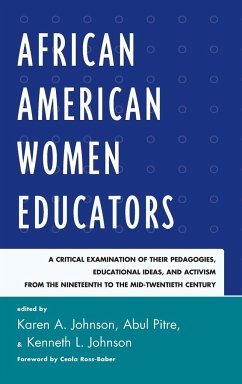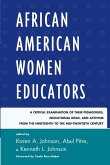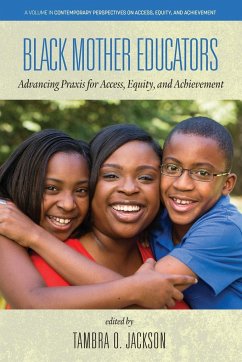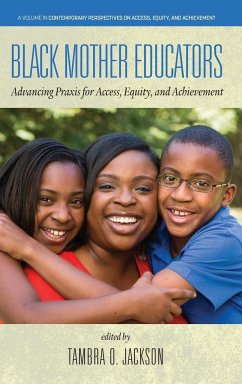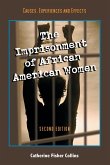African American Women Educators
A Critical Examination of Their Pedagogies, Educational Ideas, and Activism from the Nineteenth to the Mid-twentieth Century
Herausgeber: Johnson, Karen A.; Johnson, Kenneth L.; Pitre, Abul
African American Women Educators
A Critical Examination of Their Pedagogies, Educational Ideas, and Activism from the Nineteenth to the Mid-twentieth Century
Herausgeber: Johnson, Karen A.; Johnson, Kenneth L.; Pitre, Abul
- Gebundenes Buch
- Merkliste
- Auf die Merkliste
- Bewerten Bewerten
- Teilen
- Produkt teilen
- Produkterinnerung
- Produkterinnerung
This book examines the lived experiences and work of African American women educators during the 1880s to the 1960s.
Andere Kunden interessierten sich auch für
![African American Women Educators African American Women Educators]() African American Women Educators62,99 €
African American Women Educators62,99 €![Black Mother Educators Black Mother Educators]() Black Mother Educators59,99 €
Black Mother Educators59,99 €![African American Women with Incarcerated Mates African American Women with Incarcerated Mates]() Avon Hart-JohnsonAfrican American Women with Incarcerated Mates48,99 €
Avon Hart-JohnsonAfrican American Women with Incarcerated Mates48,99 €![Black Mother Educators Black Mother Educators]() Black Mother Educators101,99 €
Black Mother Educators101,99 €![Black Feminist Thought Black Feminist Thought]() Patricia Hill CollinsBlack Feminist Thought187,99 €
Patricia Hill CollinsBlack Feminist Thought187,99 €![The Imprisonment of African American Women The Imprisonment of African American Women]() Catherine Fisher CollinsThe Imprisonment of African American Women36,99 €
Catherine Fisher CollinsThe Imprisonment of African American Women36,99 €![All about Love: New Visions All about Love: New Visions]() Bell HooksAll about Love: New Visions10,99 €
Bell HooksAll about Love: New Visions10,99 €-
-
-
This book examines the lived experiences and work of African American women educators during the 1880s to the 1960s.
Hinweis: Dieser Artikel kann nur an eine deutsche Lieferadresse ausgeliefert werden.
Hinweis: Dieser Artikel kann nur an eine deutsche Lieferadresse ausgeliefert werden.
Produktdetails
- Produktdetails
- Verlag: R&L Education
- Seitenzahl: 258
- Erscheinungstermin: 18. März 2014
- Englisch
- Abmessung: 235mm x 157mm x 20mm
- Gewicht: 574g
- ISBN-13: 9781610486460
- ISBN-10: 1610486463
- Artikelnr.: 39052908
- Herstellerkennzeichnung
- Libri GmbH
- Europaallee 1
- 36244 Bad Hersfeld
- gpsr@libri.de
- Verlag: R&L Education
- Seitenzahl: 258
- Erscheinungstermin: 18. März 2014
- Englisch
- Abmessung: 235mm x 157mm x 20mm
- Gewicht: 574g
- ISBN-13: 9781610486460
- ISBN-10: 1610486463
- Artikelnr.: 39052908
- Herstellerkennzeichnung
- Libri GmbH
- Europaallee 1
- 36244 Bad Hersfeld
- gpsr@libri.de
Karen A. Johnson is an Associate Professor at the University Utah where she teaches graduate-level courses in the Department of Education, Culture, and Society. She also teaches in the Ethnic Studies Program and is the Coordinator in the African American Studies division. Abul Pitre received his Ph.D. from Colorado State University. Currently he is Professor and Department Head of Educational Leadership and Counseling at Prairie View A&M University, where he teaches Multicultural Education for Educational Leaders, Leadership, and Afrocentric Leadership Literacy. Dr. Pitre's current research interests are in the areas of multicultural education for school leaders, critical theories in leadership, and the educational philosophy of Elijah Muhammad. He was appointed Edinboro University's first named professor for his outstanding work in African-American education and held the distinguished title of the Carter G. Woodson Professor of Education. Kenneth L. Johnson is a pastor at Bethel Baptist Church in Pocatello, Idaho. He is also a doctoral candidate at the University of Utah, in the Department of Education, Culture, and Society.
Series Preface by Dr. Abul Pitre Foreword by Dr. Ceola Ross-Baber
Acknowledgments Introduction by Dr. Abul Pitre Chapter One: Invisible Woman
by Adrienne Dixson Chapter Two: Eminently Qualified by Carole Wylie Hancock
Chapter Three: Caring in the Classroom: Georgia's Black Women Teachers
Build Character on the Eve of Brown by Patrice Preston-Grimes Chapter Four:
"We were part of the plan": Southern Black Women's Experiences as Northern
National Teacher Corps Inters, 1965-1971 by Jeannine Dingus-Eason, Ph.D.
Chapter Five: Why I Teach by Cleveland Hayes Chapter Six: Septima Poinsette
Clark's Literacy Teaching approaches for Linguistic Acquisition and
Literacy Development for Gullah-speaking Children, 1916-1919 by Karen A.
Johnson Chapter Seven: Fannie Richards and Gladys Roscoe: Repertoires of
Practice of Two Early African-American Teachers in Detroit by Linda G.
Williams, Ph.D. Chapter Eight: Building Character and Culture: Lucy Craft
Laney and the Haines School Community by Audrey McCluskey Chapter Nine:
"Uplift is Up to Us": Mamie Garvin Fields and the School at Society Corner,
1926-1943 by Scott Baker
Acknowledgments Introduction by Dr. Abul Pitre Chapter One: Invisible Woman
by Adrienne Dixson Chapter Two: Eminently Qualified by Carole Wylie Hancock
Chapter Three: Caring in the Classroom: Georgia's Black Women Teachers
Build Character on the Eve of Brown by Patrice Preston-Grimes Chapter Four:
"We were part of the plan": Southern Black Women's Experiences as Northern
National Teacher Corps Inters, 1965-1971 by Jeannine Dingus-Eason, Ph.D.
Chapter Five: Why I Teach by Cleveland Hayes Chapter Six: Septima Poinsette
Clark's Literacy Teaching approaches for Linguistic Acquisition and
Literacy Development for Gullah-speaking Children, 1916-1919 by Karen A.
Johnson Chapter Seven: Fannie Richards and Gladys Roscoe: Repertoires of
Practice of Two Early African-American Teachers in Detroit by Linda G.
Williams, Ph.D. Chapter Eight: Building Character and Culture: Lucy Craft
Laney and the Haines School Community by Audrey McCluskey Chapter Nine:
"Uplift is Up to Us": Mamie Garvin Fields and the School at Society Corner,
1926-1943 by Scott Baker
Series Preface by Dr. Abul Pitre Foreword by Dr. Ceola Ross-Baber
Acknowledgments Introduction by Dr. Abul Pitre Chapter One: Invisible Woman
by Adrienne Dixson Chapter Two: Eminently Qualified by Carole Wylie Hancock
Chapter Three: Caring in the Classroom: Georgia's Black Women Teachers
Build Character on the Eve of Brown by Patrice Preston-Grimes Chapter Four:
"We were part of the plan": Southern Black Women's Experiences as Northern
National Teacher Corps Inters, 1965-1971 by Jeannine Dingus-Eason, Ph.D.
Chapter Five: Why I Teach by Cleveland Hayes Chapter Six: Septima Poinsette
Clark's Literacy Teaching approaches for Linguistic Acquisition and
Literacy Development for Gullah-speaking Children, 1916-1919 by Karen A.
Johnson Chapter Seven: Fannie Richards and Gladys Roscoe: Repertoires of
Practice of Two Early African-American Teachers in Detroit by Linda G.
Williams, Ph.D. Chapter Eight: Building Character and Culture: Lucy Craft
Laney and the Haines School Community by Audrey McCluskey Chapter Nine:
"Uplift is Up to Us": Mamie Garvin Fields and the School at Society Corner,
1926-1943 by Scott Baker
Acknowledgments Introduction by Dr. Abul Pitre Chapter One: Invisible Woman
by Adrienne Dixson Chapter Two: Eminently Qualified by Carole Wylie Hancock
Chapter Three: Caring in the Classroom: Georgia's Black Women Teachers
Build Character on the Eve of Brown by Patrice Preston-Grimes Chapter Four:
"We were part of the plan": Southern Black Women's Experiences as Northern
National Teacher Corps Inters, 1965-1971 by Jeannine Dingus-Eason, Ph.D.
Chapter Five: Why I Teach by Cleveland Hayes Chapter Six: Septima Poinsette
Clark's Literacy Teaching approaches for Linguistic Acquisition and
Literacy Development for Gullah-speaking Children, 1916-1919 by Karen A.
Johnson Chapter Seven: Fannie Richards and Gladys Roscoe: Repertoires of
Practice of Two Early African-American Teachers in Detroit by Linda G.
Williams, Ph.D. Chapter Eight: Building Character and Culture: Lucy Craft
Laney and the Haines School Community by Audrey McCluskey Chapter Nine:
"Uplift is Up to Us": Mamie Garvin Fields and the School at Society Corner,
1926-1943 by Scott Baker

